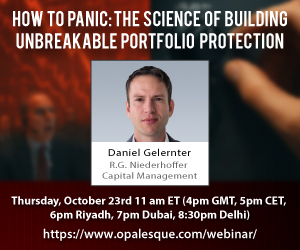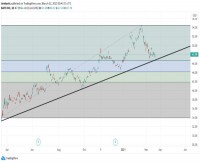|
Over coffee in Kuwait, friends encouraged me not to go to Bahrain. I was admittedly nonchalant. "Not much ever happens there," I said, relying on 20 years of uneventful travel to the island country. And besides, Gulf Air 216 is an easy end-of-the-day shuttle flight. From a car maneuvering past the Pearl Roundabout, the demonstration seemed to me largely peaceful, although accompanied by plenty of unflattering placards about the current regime. I credited it to freedom of expression and assembly. These are values not well appreciated across many of the other countries in which we operate. Bahrain seemed to me the last place in the Gulf where a government would react aggressively. The subsequent TV images of tanks in Manama were difficult to digest. As career-long advocates of the financial regulatory infrastructure promoted by Bahrain, my colleagues and I have always felt that we owned a bit of the place, metaphorically speaking. We consider the unilateral approach to regulation (offshore and onshore) advocated by Bahrain regulators to be more efficient than the bilateral approach (offshore or onshore) promulgated elsewhere. We have had funds approved by the Central Bank; we use service providers in the market; we have many friends in the local investment and banking industry. We now have to wonder how the international community will react when we advocate for engagement with Bahrain. We can only hope that industry policy will remain separate and distinct from political maneuvering. Whatever the Shiite demands on the Sunni-led government, few have ever spoken against ongoing development of the financial services sector, which accounts for roughly 25% of the country's GDP. Economically speaking, Bahrain seems more or less a model nation by comparative objective metrics. We consider three indicators: Corruption. Bahrain meets a reasonable standard here. Transparency International ranks the country as 48th in the world in its 2010 Corruptions Perceptions Index. The ranking is better than Malaysia's and in line with those of Poland and the Czech Republic. See transparency.org (see reference link) for more information. Competiveness. Bahrain holds its own in providing business opportunities. In the regional version of the World Bank's Doing Business survey, the country ranks second in the 18-country Middle East and North Africa grouping. Saudi Arabia is at the top of the list. See doingbusiness.org (see reference link) for more information. Income Equality. One measure of wealth distribution is the Gini coefficient, with 0 representing perfect equality and 100 representing perfect inequality. The data estimates for the GCC range from 30 to 39, with Bahrain sitting solidly at 36. The number for the United States is actually farther from equality at about 45. See visionofhumanity.org (see reference link) for context. Gini coefficients may measure equality of income, but they assuredly do not measure equality of opportunity. That may be the crux of the matter behind this civil unrest. The Khalifa family is the focal point for dashed aspirations, magnified by the global downturn. Literacy has climbed from 70% in 1981 to more than 90% today, but the rise in value-added labor positions has been relatively weak, at least on an observational basis. Official unemployment lingers at 5.5%, but the number seems fanciful for 15-to-24-year-olds. In the absence of hydrocarbon resources, Bahrain tends to play the role of poor cousin among its GCC brethren. The country actually may not be so underprivileged-both Saudi Arabia and Oman have lower per capita income levels than Bahrain. The nation's decades-long emphasis on growing other business segments, especially finance, has evidently been paying off. Bahrain's shortage of oil accompanies a wealth of visible sectarian issues, especially compared to other Gulf nations. The Shiite majority has been vocal in declaring a lack of economic opportunity. The attendant rage is common to humankind. Not long ago, the entry stamps inside my passport started proclaiming "Business Friendly Bahrain." The slogan is the foundation of a public relations and advertising campaign rolled out by the Bahrain Economic Development Board. Interestingly, this government department is chaired by Crown Prince Salman Bin Hamad Al-Khalifa, who stepped to the forefront as the monarchy shifted away from a hawkish stance toward an appeal for national dialogue with demonstrators. Having seen the prince in action as his country's business ambassador, we have some confidence in his ability to listen, synthesize, and articulate solutions. Commercial interests in flourishing trade and open markets tend to form the most potent long-term force for peace and understanding. Our point is pragmatic, not cynical. Now more than ever, Bahrain needs to figure out how to be truly "business friendly." If the nation's economic strategy relies on the enthusiasm of the international business community, regaining global confidence will be critical to providing economic opportunity of any degree, let alone parity among citizens. The government has a very full plate. The picture of Bahrain unveiled to the world in mid-February is quite different from the one depicted on the website of the Bahrain Economic Development Board (see reference link). We look forward to a return to alignment. Your feedback and comments are very important to us, please feel free to contact the author via email. |
Opalesque Islamic Finance Intelligence
Opinion Column: Bahrain: Time to be Truly Business-Friendly, By Douglas Clark Johnson |
|





 RSS
RSS










